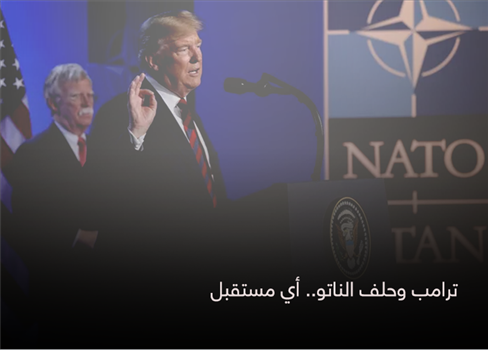
[ad_1]
___________________________
(Iyad Qatlawi)
______________
February 24, 1446
August 28, 2024 AD
_____________________

As Donald Trump returns to the forefront of the US presidential election, many foreign archives bear the shadow of the impact of his first term, with the EU and NATO issues being particularly prominent as Europeans live in a state of anticipation and anxiety about Trump’s return to the White House.
The possibility of Trump winning the US presidency is causing growing anxiety among European politicians, who see a potential Trump electoral victory as a clear threat to Europe, as Republicans continue to block Trump’s military aid to Ukraine in Congress, and Berlin, Europe’s largest supplier of weapons to Ukraine, fears that a reduction in US military aid to Ukraine would force it to increase spending in support of Kiev.
In addition, there are strong concerns that European countries’ cooperation with the United States within the North Atlantic Treaty Organization (NATO) will be at risk, and one of Trump’s most prominent threats in this regard is that he has indicated to NATO that countries that do not commit to meeting the goal of 2% of GDP for defense spending will not receive US aid, and implement his previous decision to escalate the transatlantic trade war, in addition to his continued threats of trade and agricultural wars with Germany and France.
Europe is worried about Trump’s re-election because he would withdraw from NATO, as he has repeatedly stressed: "This is an outdated alliance and leaving Europe would save the US millions of dollars a year" Or its collapse, despite being the most important military alliance of the United States for 74 years, as it strengthens the influence of the United States by uniting the countries on both sides of the Atlantic to defend each other. The withdrawal of the United States from the alliance would also mean damaging its image in the world, which would be a strategic disaster not only for the allies but also for the United States itself, as it spends more on defense than its partners combined and the alliance is classified as the strongest in history simply by its existence.
Fear has also spread to Ukraine, which would also be afraid if Trump stopped supplying it with weapons, as any shortfall in U.S. weapons supplies to Kiev would mean an undeclared freeze in Russia’s war on Ukraine.
Trump’s inauguration in 2016 was a response to the rise of the far right in Europe at the time, but the slogan he adopted… "Make America Great Again" It forms the cornerstone of a policy of distance from the old continent, and a new fear of its return, which could complicate economic relations with Trump if he wins on November 5 next year, especially after the US trade deficit. With Trump, the matter will become more intense, as he promises to increase the tariffs already imposed on imports (10%), including European goods, and to impose higher tariffs on the coming Chinese manufacturers’ vision of exporting their products to European ports, a double threat to the EU, which, in addition to commercial and economic risks, faces a double dilemma. In addition to the fact that the continent needs American arms deals to support Kiev since the suspension of energy imports from Russia due to the war in Ukraine, close ties with the United States in terms of gas supplies also mean that the EU remains dependent on the United States for security, economy and support.
In the same context, Europe is worried that if Trump wins, the United States will become a hard-to-deal-with American fortress. In this context, if this slogan reappears, Europe will be more lonely than ever. "us" With Trump"It must prepare for a second Trump scenario, which requires it to become a strong player at the political and military levels, able to deal with security issues in its neighborhood, and to strengthen itself economically, ready for possible protectionist measures from a second Trump administration. The reaction within the EU has been characterized by: in most cases, there is great concern about Trump’s return, which requires immediate preparation for the possibility of disengagement on the part of the United States and readiness to take more actions on its own.
Fear also spreads to Ukraine, which will also be afraid if Trump stops supplying it with weapons, because any shortage of American weapons to Kiev means a freeze in Russia’s undeclared war on Ukraine, and the possibility of negotiations that suit itself will increase. For Russia, it will create an accelerated test, both in terms of forcing Kiev to give up some territory and in terms of closing the door to its future membership in NATO, that is, the sudden withdrawal of the United States from its Atlantic obligations. If Trump comes to power, the first test will certainly be related to the Russian-Ukrainian war.
Trump’s potential victory could put European countries, led by the United Kingdom, in an awkward position as former British Prime Minister Sunak signed a ten-year security cooperation agreement with Ukrainian President Zelensky, because the United Kingdom did not provide the necessary resources to massively aid Ukraine, given that… the United States is unwilling to assume alliance obligations within NATO and ensure the security of European allies, which is exactly what Trump wants, forcing the EU and NATO countries to think more about reducing their dependence on them and consider alternatives away from the United States in dealing with problems on the continent and the region as a whole.
__________________________________________________
[ad_2]
Source link

